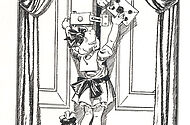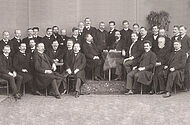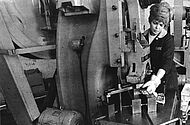
Start-up since 1919
News | 19. August 2019.Once upon a time....", that's how fairytales begin, but it's also how EVVA's history began. One hundred years ago Ludwig Tschörner had the idea to establish a company. That was soon after the First World War. The old order had come to an abrupt end. Women's skirts were becoming shorter and technical innovations were starting to change daily life. Against that backdrop, Tschörner founded a company with two like-minded people, which was renamed the 'Erfindungs-, Versuchs- und Verwertungsanstalt Tschörner, Plischke, Lischanowsky & Co', in English, the 'Invention, Experimentation and Application Institute'. And so, the 'EVVA' acronym was born.
Turbulent beginnings
The first roller shutter lock was quite the idea. It attracted investors and EVVA was transformed into a limited liability company (GmbH) with 21 members. Yet by 1925 a forced settlement was imposed on the company. However, EVVA lived on as 'EVVA Schmierfettfabrik (lubricant factory) GmbH', today known as EVVAOIL. Master mechanic and entrepreneur, Karl Jindrich, ultimately acquired the patent for a rim lock and thereby also the registered EVVA brand. Under him, EVVA became a manufacturer of high-quality security technology with the first double cylinders to be produced in a factory. In 1937 Jindrich patented an entirely new design for a padlock, which was EVVA's first recorded security patent.
Things started looking up again after the war
During the Second World War, EVVA continued its production. It did, however, even fill orders for the Wehrmacht. By the end of March 1944, EVVA was forced to stop the production of all goods that were not essential to the war effort. After the end of the war, Karl Jindrich managed to get EVVA up and running again, despite a shortage of machinery and workers, because all of the new buildings and apartments needed locks. The company needed to expand, and the Wienerbergstrasse 63-65 site became operational. To this day it remains the company's headquarters. After his death in 1958, Karl Hindrich's widow, Hedwig and daughter, Eva, along with her husband, Alfred Pitsch, continued running the company.
The company is at a tipping point in the 70's
What had begun well almost became a catastrophe: Fifteen years later, EVVA was facing bankruptcy. Only a takeover could save the company and the 170 jobs that had been created. Its market share and strong name attracted investors, but one in particular won out: Nikolaus Bujas, CEO of the rival company, 'Gebrüder Grundmann.' Differences with his co-owner caused the then 63 year-old to take a chance on a new start for EVVA, and give up the family company after 40 years. With his knowledge from four generations in the lock and security industry, he was able to save the ailing company. With the dedicated support of his son-in-law, Sven Berlage, the management doubled the company's turnover within five years. The turnaround was a success.
Unwanted stagnation
For the owners, sitting back and resting on their success was a foreign concept. With their finger firmly on the pulse, but always with a realistic idea of what was practicable, the owners concentrated on the founding philosophy: 'invent, experiment, apply' - and all in-house. They came up with some solutions that changed the market, such as the world-first locking system calculation performed by a computer, or the magnet technology that is copy-proof, still to this day.
Without partners, it wouldn't be possible
The boom in production went hand in hand with the very close and long-term contacts with specialist retail partners, customers and suppliers that the management was establishing. EVVA has always treated partners as equals, and proven itself to be a reliable and trustworthy partner. The result of this is very high levels of customer satisfaction. Partner companies appreciate the extensive product range, high quality as well as security technology training offered by the EVVA Academy.
Meidling is too small
Even back then it was clear to the owners: they needed to look beyond Austria. The German-born Sven Berlage pushed ahead with the company's internationalisation. EVVA's own subsidiaries, starting with Krefeld, were established and a network of distributors was built up. Today EVVA has a presence outside of Europe, especially in the Middle East, East Asia and Australia.
On the road to the future
The company remained firmly in the family's hands, as Nicole Ehrlich-Adám started working alongside her father and grandfather at the end of the 1980s. Her husband, Stefan, also joined the company in 1993. By working together, the three generations managed to get through 1999, the fateful year in which Sven Berlage and Nikolaus Bujas passed away within the space of a few months. It was precisely at this trying time that electronics became a new buzzword. And once again, EVVA managed to combine the old and new in a tried and tested way. XESAR and AirKey are trailblazers for the move towards digitalisation and they lay the foundations for the next 100 years of the company's history.
One of the first to take responsibility for the future
- 'Clean Production' in factories without oil, lubricants or water
- Metal chips are 100% recycled Waste water from electroplating is 100% recycled
- 50% reduction in electricity usage with new lighting
- Photovoltaic rooftop systems in Vienna and at EVVA Italia to generate our own energy
This is what EVVA produces every year from 700 tonnes of metal
- 2 million mechanical security cylinders
- 3 million keys
- 300,000 electronic components (such as wall readers, e-cylinders, and so on)
- 100,000 electronic identifaction media




How would you like to share?